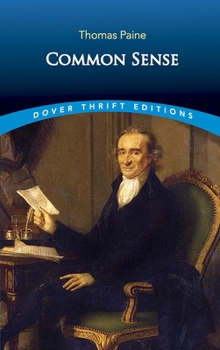Book Overview
Among the most influential authors and reformers of his age, Thomas Paine (1737-1809) was born in England but went on to play an important role in both the American and French Revolutions. In 1774, he emigrated to America where, for a time, he helped to edit the Pennsylvania Magazine . On January 10, 1776, he published his pamphlet Common Sense, a persuasive argument for the colonies' political and economic separation from Britain. Common Sense cites the evils of monarchy, accuses the British government of inflicting economic and social injustices upon the colonies, and points to the absurdity of an island attempting to rule a continent. Credited by George Washington as having changed the minds of many of his countrymen, the document sold over 500,000 copies within a few months. Today, Common Sense remains a landmark document in the struggle for freedom, distinguished not only by Paine's ideas but also by its clear and passionate presentation. Designed to ignite public opinion against autocratic rule, the pamphlet offered a careful balance between imagination and judgment, and appropriate language and expression to fit the subject. It immediately found a receptive audience, heartened Washington's despondent army, and foreshadowed much of the phrasing and substance of the Declaration of Independence.
Format:Paperback
Language:English
ISBN:0486296024
ISBN13:9780486296029
Release Date:August 2016
Publisher:Dover Publications
Length:64 Pages
Weight:0.60 lbs.
Dimensions:0.2" x 5.2" x 8.2"
Age Range:14 years and up
Grade Range:Grade 9 and higher
Customer Reviews
4 ratings
We have it in our power to make the world over again
Published by Thriftbooks.com User , 17 years ago
This was a required reading for a graduate humanities class. John Keane's biography succinctly showed that Tom Paine (1737-1809) was the consummate revolutionary and a daring adventurer. Not only was he an important figure in the American Revolution, but he also traveled to France in 1791 to give that revolution a push. Paine traveled from England, just in time to stoke the flames of the revolution with his pamphlet Common Sense, in January 1776. To call Common Sense a sensation in the colonies is actually a bit of an understatement. It was an unparallel sensation and monumental work of Enlightenment rhetoric that quickly fanned the flames of rebellion throughout the colonies. In four months, over 120,000 copies were printed in the colonies--over 500,000 copies by years end. No other pamphlet printed in seventeenth century America came close to its success. Most importantly, Common Sense served to get the colonial patriots to drop their fear of open rebellion, and also emboldened those delegates who favored declaring independence from Britain. The delegates now had the confidence that a large segment of the colonists would support rebellion. Similar to the Declaration of Independence, the philosophical ideas in Common Sense are primarily from the English philosopher, John Locke (1632-1704). The most moving quote from the pamphlet became quite prophetic, when one considers the impact it ultimately had on the delegates in the congress, the drafting of the Declaration of Independence, and on the world. "We have it in our power to begin the world over again." As a graduate student in philosophy and history, I heartily recommend this timeless classic to anyone who is interested in political philosophy, and history.
One of the Greatest Books Written
Published by Thriftbooks.com User , 17 years ago
Thomas Paine's Common Sense did, in fact, make sense. It gave the reasoning as to why the colonies should revolt against the British Empire. Easily a favorite.
A book that changed the world
Published by Thriftbooks.com User , 20 years ago
Very few books have great influence and truly make a change in the world. This book is one of them. It was a decisive element in promoting the idea of an America free of monarchial, British rule. Paine writes with passion but also with clear, cold sense as to why the colonies should for economic, social and moral reasons cast off the yoke of British rule. In doing so he promotes the ideal of a democratic society which will benefit not a privileged few but the people as a whole. This is one of the great American political works and its publication in itself a milestone of American history.
Rationale for a Revolution
Published by Thriftbooks.com User , 22 years ago
Writing a review for this book is a lot like writing a review for The Constitution. It seems as though there are not enough words to describe the majesty of the document.Many of the founding fathers lacked the educational training that contemporary politicains have received. With that fact in mind, Common Sense is even more potent. Thomas Paine sought to make his fellow colonists join in rebelling against the King and the British. His argument is based in the relative absurdity of being ruled by a king whose power is gained only because of the status of his parents. Even the first king in succession probably only gained his power by being the most brutal ruffian in his gang of conquerers. For those who suggest that the relationship with Britain need not be changed because "it is not broke, so don't fix it", he uses a child that nurses too long from his mother as a metaphor. Paine continues his writing with other choice prose to rationalize independence.Paine's words were a biting commentary against the King. Even today, these words maintain their potency. No America should live without reading this book which was the reasoning for our break from Britain.






